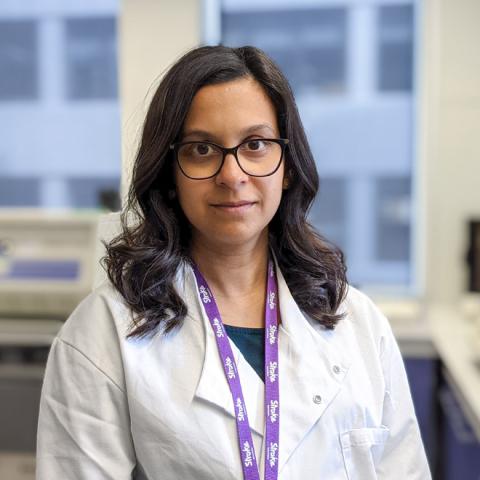Why is this research needed?
Most strokes happen in people over the age of 65. But stroke can strike at any age, and a third of strokes happen in people between 40-54 years old.
Researchers have found that there’s a damaging build-up of a protein called amyloid-beta in blood vessels in the brains of some younger adults who had surgery in their head or neck in childhood and have gone on to have a stroke caused by a bleed in their brain. This build-up of protein is called iatrogenic amyloid-beta cerebral amyloid angiopathy (iCAA).
It’s critical that we understand more about iCAA so that we can stop it causing strokes and devastating people’s lives.
What are the aims of the research?
Dr Gargi Banerjee will set up three studies that she hopes will improve our understanding of the risk of iCAA and stroke, how we can spot iCAA and its effects, and how amyloid-beta protein builds-up in the brain.
In these three studies, Gargi will:
- Assess and follow ten people who received the type of medical treatment as children that may put them at a higher risk of a build-up of amyloid-beta protein in their brains.
- Compare samples of blood and cerebrospinal fluid (the fluid that surrounds the brain and spinal cord) from people with iCAA to look for signs of amyloid-beta protein build-up in the brain.
- Explore models of brain disease in mice to better understand how amyloid-beta proteins can cause different conditions (including bleeding in the brain and thinking and memory problems), and how these damaging proteins may be transferred into the brain during surgery.
Gargi said, “Right now, stroke doctors and researchers are underprepared to manage this emerging disease as there is limited information about how many people it affects or how it can be passed between people. By studying people at risk of iCAA, as well as people who have been diagnosed with iCAA, we will make an essential contribution to the knowledge of this condition, which is crucial for informing healthcare professionals, researchers and public health bodies.”
What benefits could this have for stroke survivors?
The idea that damaging proteins can be transferred into the brain during surgery and cause a stroke is new to stroke medicine. This means that we have very little information about how many people might be affected, or what we can do to reduce the risk that someone with iCAA will go on to have a stroke caused by bleeding in the brain.
This cutting-edge research can change this by increasing our knowledge in this area. This will lead the way for researchers to find out how we can help more people avoid damage to their brains and the devastating effects that can have, such as strokes and dementia.
Meet the researcher

Dr Gargi Banjeree is currently training as a neurologist - a doctor who specialises in identifying, treating and preventing problems in the brain. She completed her PhD in 2019, which investigated how the build-up of damaging proteins in the blood vessels of the brain can cause conditions like stroke and dementia. Over the next four years, she will spend half of her time dedicated to research, and the other half continuing her clinical training.
In order to pull off this ambitious programme of research, Dr Banerjee will build and support a team of researchers with a range of skills, from helping patients participate in trials to analysing blood samples.
Dr David Werring, a Neurologist and Stroke Association-funded researcher, is supporting Dr Banerjee. He said: “She is not only an excellent clinician but has also clearly demonstrated exceptional enthusiasm and aptitude for research. With this rare combination of skills, she has the potential to make an important long-term contribution as a clinical stroke researcher.
This research is being jointly funded by the Stroke Association and the National Institute for Health Research (NIHR). Dr Gargi is also awarded funding as an Alzheimer's Research UK Clinical Research Fellowship.
